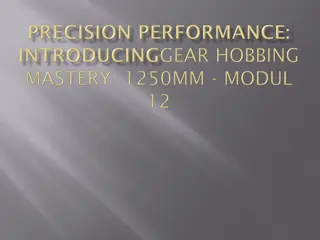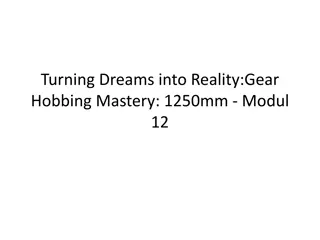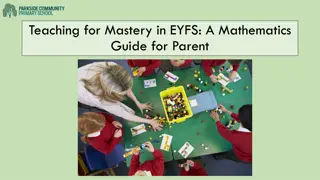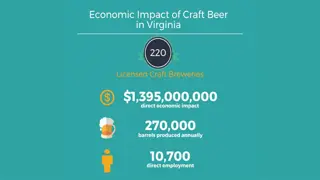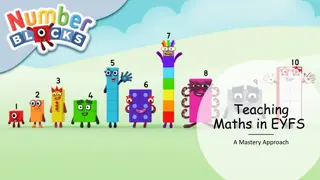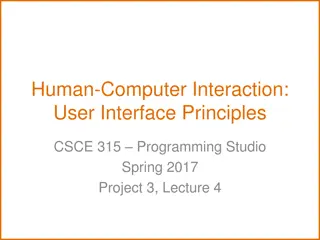Introduction to User Research and Craft Mastery
Delve into user research methodologies and masterful craft acquisition through sessions covering digital identity, structuring interviews, learning a craft, and various types of user research. Gain insights into the significance of user research and the art of mastering a craft.
Download Presentation

Please find below an Image/Link to download the presentation.
The content on the website is provided AS IS for your information and personal use only. It may not be sold, licensed, or shared on other websites without obtaining consent from the author.If you encounter any issues during the download, it is possible that the publisher has removed the file from their server.
You are allowed to download the files provided on this website for personal or commercial use, subject to the condition that they are used lawfully. All files are the property of their respective owners.
The content on the website is provided AS IS for your information and personal use only. It may not be sold, licensed, or shared on other websites without obtaining consent from the author.
E N D
Presentation Transcript
The Joint Effort for Data assimilation Integration (JEDI) Model Space Joint Center for Satellite Data Assimilation (JCSDA) JEDI Academy - 10-13 June 2019
Introduction OOPS consists of a number of generic classes, each designed to handle a specific task or set of tasks without knowing the kind of model for which data assimilation is being performed. Some of these classes require a specific implementation in order to perform their task. Consider the state or observation operator for example. There s a class to handle these in oops but they re fairly meaningless without a specific state or observation operator. Other classes can have meaning without a specific implementation, e.g. the CostFunction class. However these classes often make use of other classes with a specific implementation, a cost function uses a state for example. In JEDI we use the term Model Space to refer to the parts of the data assimilation system (classes) that require implementation for the specific model and the classes that fall under that category as interface classes.
Interface class All model or observation specific classes are wrapped into an interface class Using the C++ templates this is not strictly necessary but provides a convenient place to group all interfaces and make them visible Each interface class contains a (smart) pointer to the actual implementation defined by the model trait (more on traits later) and passes the calls down The interface layer is also used to instrument the code Timing statistics Trace execution Interface classes are all in oops/src/oops/interface
Interface class Abstract Layer Generic applications Forecast EnKF PF 4DVar H(x) Uses Interface layer State Model Covariance Observations Implementation Lorenz FV3GFS GEOS MOM6 Specific models In this simple example FV3GFS would need to implement State, Model, Covariance and Observations and pass those traits in order to create a 4DVar application.
Interface class Class of specific implementation (from trait) template <typename MODEL> class State { typedef typename MODEL::State State_; public: /// Most methods have been removed for readability Access specific object (only for use in interface classes) Name of method is name of class in lowercase /// Interfacing State_ & state() {return *state_;} const State_ & state() const {return *state_;} /// Get state values at observation locations void getValues(const Locations_ &, const Variables &, GeoVaLs_ &) const; private: boost::scoped_ptr<State_> state_; }; Smart pointer to actual object
Interface class Example of a method in an interface class template<typename MODEL> void State<MODEL>::getValues(const Locations_ & locs, const Variables & vars, GeoVaLs_ & gvals) const { Log::trace() << "State<MODEL>::getValues starting" << std::endl; util::Timer timer(classname(), "getValues"); state_->getValues(locs.locations(), vars, gvals.geovals()); Log::trace() << "State<MODEL>::getValues done" << std::endl; } Timer will be destructed when going out of scope Constructor and destructor do the work Trace method on entry and exit Method of specific implementation is called, with actual arguments
Model design: xt=M(x0) grid.create( ) model.create( ) model.initialize( ) Setup (lots of stuff) model.initialize( ) Time Loop model.step( ) Timestep Clean-up (sometimes) model.finalize( )
Model space interface classes Model space-related classes required by OOPS-JEDI Geometry State Increment InterpolatorTraj Geometry, State, Increment, interpolation Model LinearModel Models ErrorCovariance Localization Background error covariance ModelAuxControl ModelAuxCovariance ModelAuxIncrement Model bias correction or parameter estimation (empty for now) VariableChange LinearVariableChange Nonlinear and linear change of variables
State class template <typename MODEL> class State : public util::Printable, private util::ObjectCounter<State<MODEL> > { public: static const std::string classname() {return "oops::State";} /// Constructor, destructor State(const Geometry_ &, const eckit::Configuration &); State(const Geometry_ &, const State &); State(const State &); ~State(); State & operator=(const State &); /// Interfacing State_ & state() {return *state_;} const State_ & state() const {return *state_;} /// Get state values at observation locations void getValues(const Locations_ &, const Variables &, GeoVaLs_ &) const; void getValues(const Locations_ &, const Variables &, GeoVaLs_ &, InterpolatorTraj_ &) const; /// Time const util::DateTime validTime() const {return state_->validTime();} /// I/O and diagnostics void read(const eckit::Configuration &); void write(const eckit::Configuration &) const; double norm() const; Geometry_ geometry() const; private: void print(std::ostream &) const; boost::scoped_ptr<State_> state_; };
Increment class template <typename MODEL> class Increment { public: static const std::string classname() {return "oops::Increment";} /// Constructor, destructor Increment(const Geometry_ &, const Variables &, const util::DateTime &); Increment(const Geometry_ &, const Increment &); Increment(const Increment &, const bool copy = true); virtual ~Increment(); /// Interfacing Increment_ & increment() {return *increment_;} const Increment_ & increment() const {return *increment_;} /// Get increment values at observation locations void getValuesTL(const Locations_ &, const Variables &, GeoVaLs_ &, const InterpolatorTraj_ &) const; void getValuesAD(const Locations_ &, const Variables &, const GeoVaLs_ &, const InterpolatorTraj_ &); /// Interactions with State void diff(const State_ &, const State_ &); /// Time const util::DateTime validTime() const {return increment_->validTime();} void updateTime(const util::Duration & dt) {increment_->updateTime(dt);} /// Linear algebra operators void zero(); void zero(const util::DateTime &); Increment & operator =(const Increment &); Increment & operator+=(const Increment &); Increment & operator-=(const Increment &); Increment & operator*=(const double &); void axpy(const double &, const Increment &, const bool check = true); double dot_product_with(const Increment &) const; void schur_product_with(const Increment &); void random(); void accumul(const double &, const State_ &); /// I/O and diagnostics void read(const eckit::Configuration &); void write(const eckit::Configuration &) const; private: void print(std::ostream &) const; boost::scoped_ptr<Increment_> increment_; };
ModelBase Factory Some of the constructors in JEDI use factories. This is a powerful way of constructing objects in JEDI that allows for run time choice of constructor without lots of messy if statements. The Model class in JEDI is an example of using a factory.
Pseudo model Four dimensional data assimilation algorithms require forecasts through the data assimilation window. Typically this is done by connecting JEDI to the forecast model and stepping the model in time while calling the post processors. Alternatively the forecast can be achieved using IO. In OOPS there is a generic pseudo model class. Instead of the step method containing a call to the forecast model is call the state.read method and reads a model state from a previously run forecast.
LinearModel class template <typename MODEL> class LinearModel : public util::Printable, private boost::noncopyable, private util::ObjectCounter<LinearModel<MODEL> > { public: static const std::string classname() {return "oops::LinearModel";} LinearModel(const Geometry_ &, const eckit::Configuration &); ~LinearModel(); /// Run the tangent linear forecast void forecastTL(Increment_ &, const ModelAuxIncr_ &, const util::Duration &, PostProcessor<Increment_> post = PostProcessor<Increment_>(), PostProcessorTLAD<MODEL> cost = PostProcessorTLAD<MODEL>(), const bool idmodel = false) const; /// Run the adjoint forecast void forecastAD(Increment_ &, ModelAuxIncr_ &, const util::Duration &, PostProcessor<Increment_> post = PostProcessor<Increment_>(), PostProcessorTLAD<MODEL> cost = PostProcessorTLAD<MODEL>(), const bool idmodel = false) const; // Set the linearization trajectory void setTrajectory(const State_ &, State_ &, const ModelAux_ &); // Information and diagnostics const util::Duration & timeResolution() const {return tlm_->timeResolution();} protected: // Run the TL forecast void initializeTL(Increment_ &) const; void stepTL(Increment_ &, const ModelAuxIncr_ &) const; void finalizeTL(Increment_ &) const; // Run the AD forecast void initializeAD(Increment_ &) const; void stepAD(Increment_ &, ModelAuxIncr_ &) const; void finalizeAD(Increment_ &) const; private: // diagnostics void print(std::ostream &) const; boost::scoped_ptr<LinearModelBase_> tlm_; };





![❤[READ]❤ Deep Space Craft: An Overview of Interplanetary Flight (Springer Praxis](/thumb/21511/read-deep-space-craft-an-overview-of-interplanetary-flight-springer-praxis.jpg)


